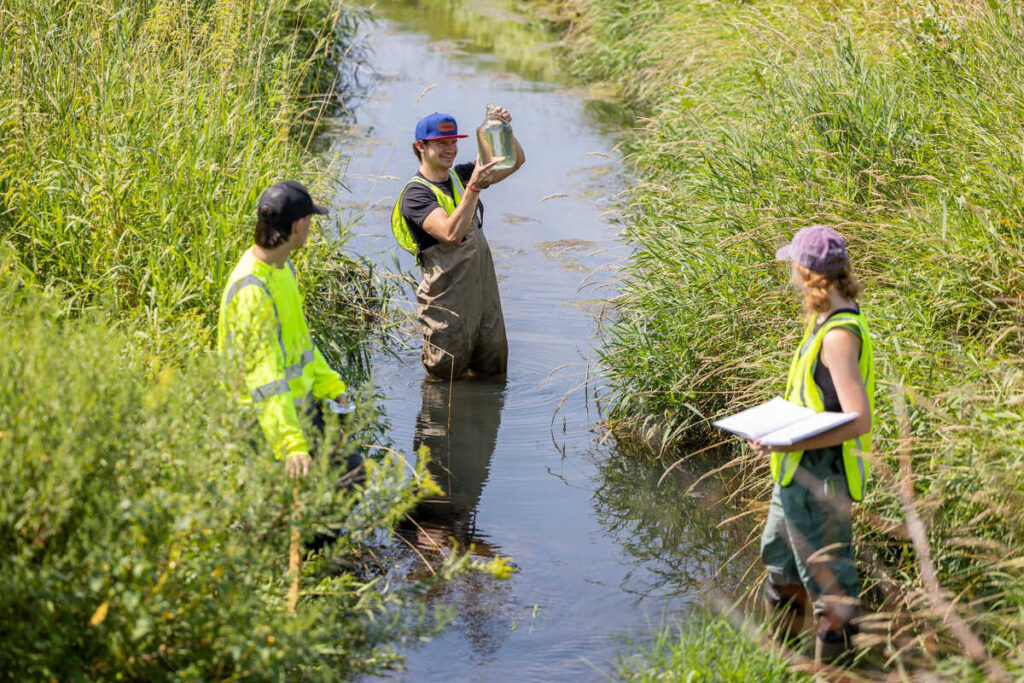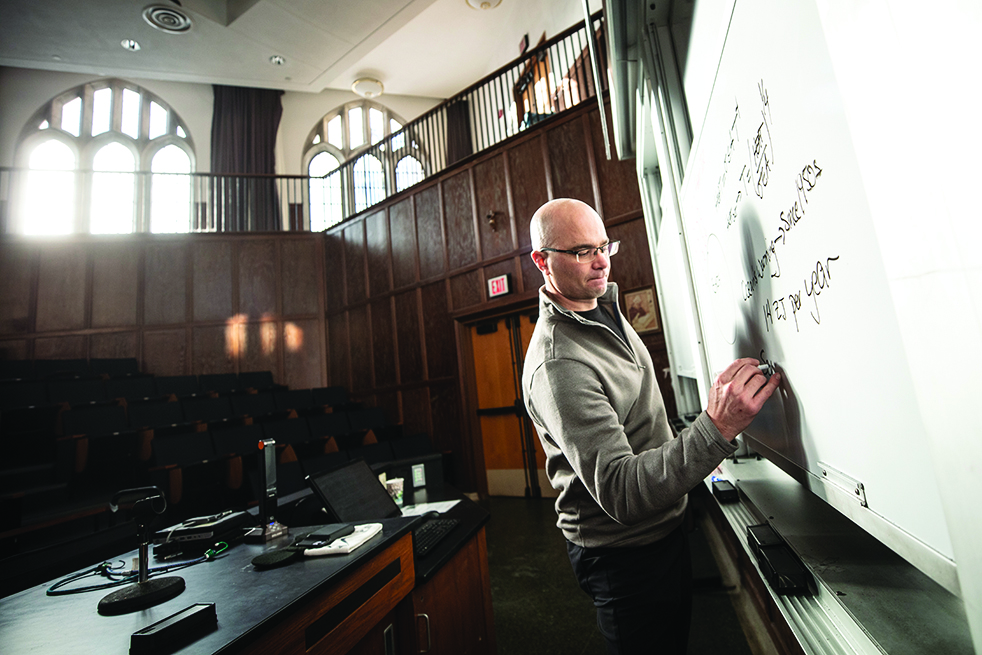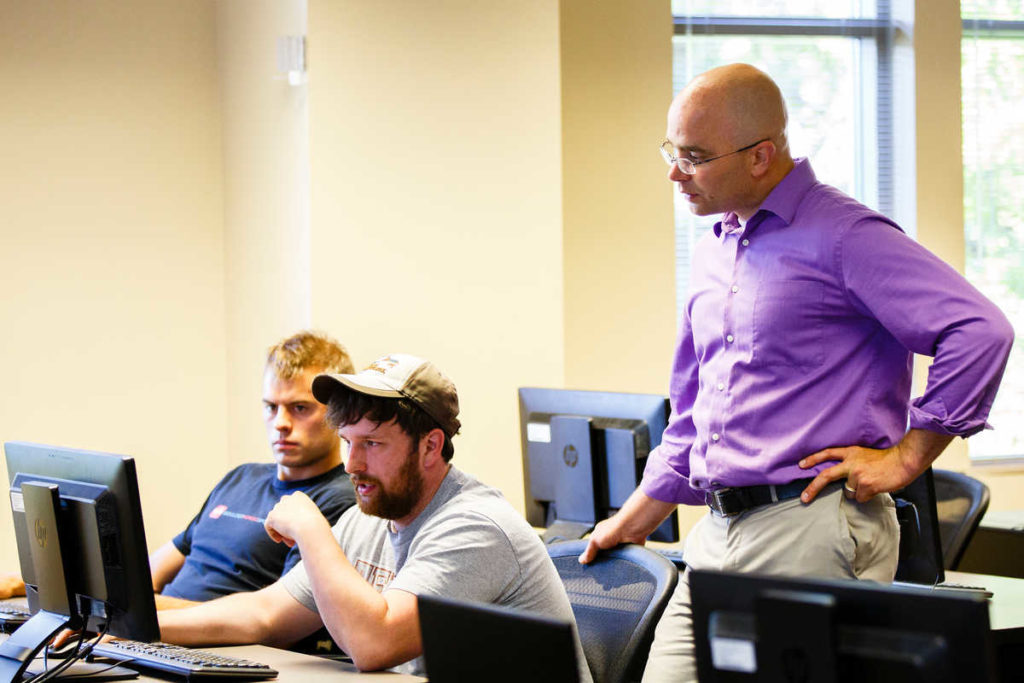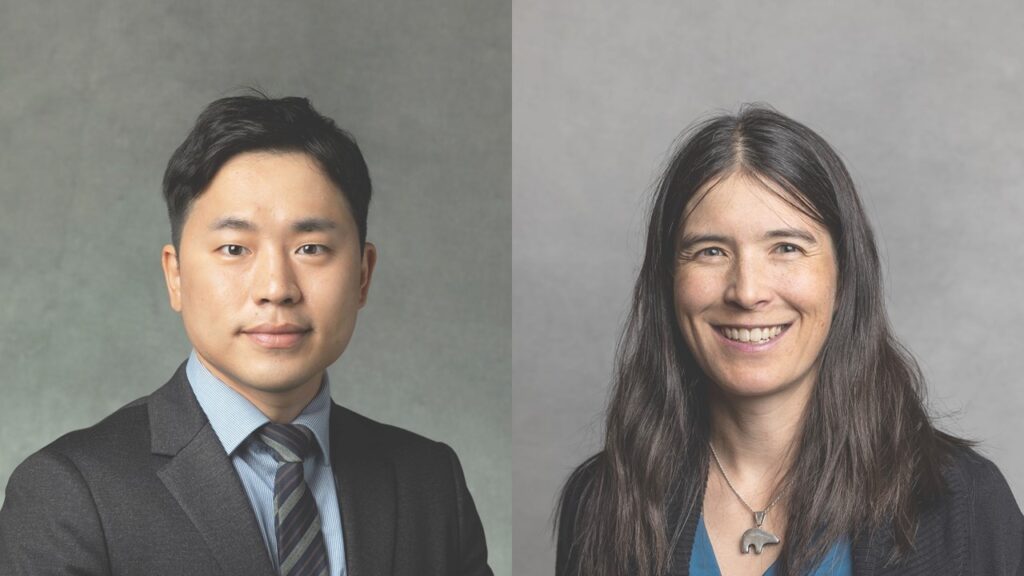Jenna Ness '14 admits that as a sophomore her understanding of global climate change and environmental issues was slim. That is, until Dr. Elise Amel, a psychology and environmental studies professor at St. Thomas, spoke at a Psychology Club meeting during her sophomore year.
"She did this whole presentation that really shocked me. I wanted to know more about it and whether I actually believed all of these problems to be real, and then whether they had real potential to cause even bigger problems with real human suffering and impact," Ness said.
After Amel's talk, Ness took an environmental studies course and fell for the subject, becoming an environmental studies and psychology double major. A year and a half later she turned her growing interest into a full-fledged, extracurricular study, "Climate Change Attitudes and Behavior: Are They Powered by Psychological Distance and Action Goals?" on which Amel served as her adviser.
The purpose of Ness' experiment was to test for differences in how her test subjects (180 St. Thomas undergraduate psychology students) felt about global climate change when the threat seemed near or far away.
One set of students read a short essay on climate change effects in Minnesota. Another group read the same essay with one crucial change: Arizona was substituted for Minnesota. A third group – a control group – read an essay on Internet privacy.
After reading the essay, all of the participants completed an online survey that measured their knowledge on climate change; however, for this portion of the experiment, participants from each of the three groups were divided in half to test for "goal commitment" – the variable at the heart of Ness' study. Half completed surveys that included a suggestion for a general goal for action (reducing greenhouse gasses by 2 percent each year until 2050) and were given a specific example for doing so (reducing their driving by 60 miles per month by taking the bus, carpooling or combining trips). The other half did not receive the suggestion.

Jenna Ness
All of the students rated their agreement or disagreement with statements such as "I believe my actions have an influence on global warming and climate change" and "My everyday consumption and buying behavior has an influence on global warming and climate change," among others. Participants also took a memory quiz based on the essay.
Ness hypothesized that the students who read the Minnesota essay (and who, therefore, had less psychological distance from the climate problem illustrated in the essay) would demonstrate a keener affinity for climate change problems and a greater desire to take action against them.
She analyzed the responses to gauge each group's psychological distance, self-efficacy, goal commitment, solution relevance (did they find the suggested goal for action effective?) and statement credibility (did they find the information credible?) in relation to climate change.
"The results were surprising, but our hypothesis seemed to be at least half correct," Ness said. As she suspected, the Arizona readers who completed the survey without the suggestion for how to take action proved to be far less committed to getting involved with reducing their carbon footprints than their Minnesota-essay counterparts. What they didn't expect, however, was that the Arizona readers had an almost equally high goal commitment as the Minnesota readers as long as they were given an action to take.
Why? It's all in theory, Ness said, but she and Amel believe "the Arizona group needed an example of an action to take if climate change was perceived to be far away because they felt more helpless and perplexed over what they could do to make a difference."
"Jenna's research emphasizes that the way we respond to engaging in environmentally sustainable behavior is complex," Amel said. "While people typically make better progress when they think about specific goals, providing specific ideas of how people can engage in climate change might sometimes backfire. When people think about their own lives specifically (the effects of climate change in Minnesota), they seem to like the autonomy associated with developing their own ideas rather than relying on others' specific suggestions. On the other hand, when thinking about climate change in the abstract (faraway people and places that are affected by climate change), people seem to respond well to specific ideas about how to change their behavior. This is really critical information for organizations trying to encourage sustainable behavior; it may help them create more effective communication tools."
A budding conservation psychologist
Ness' study contributes to the emerging field of conservation psychology, which examines how human behavior affects the nonhuman world.
"Conservation psychology is important because climate change is an ever-pressing issue. Climatologists and similar scientists are in 99.9 percent consensus that it is happening, it is at the fault of human activity and that major and drastic consequences can result from it," Ness said. "If it is the fault of humans, then why don’t humans change? Why don’t we make efforts to save our own planet? What makes people care or not care, change their lives or not, and what can we do to fix this issue? These are the huge kind of questions that conservation psychology attempts to answer."
Ness, who graduated in May, now works full time as a trainee health inspector with the Hennepin County Environmental Health Department, where she inspects pools, well water, vending machines, and food and lodging establishments for health and safety hazards.
"I show up on routine but random inspections and have the ability to write businesses up for violations and adjust their workplace management in a way that not only abides with state and county code but that is safe to the public," she said.
She said her dream job is hard to pin down this early in her career but acknowledged she wouldn't be satisfied in a job in which she couldn't make a "real-world impact." As with her current role, in the long run, Ness finds value in work that brings clarity, connection and consensus to issues surrounding climate change.
"Not being connected to climate change facts just promotes this ignorance that is blissful. Many avoid caring about the issue because the idea of losing the life as we know it is extremely threatening. It can also be overwhelming and leave people flustered with thoughts like, 'Well, what can one person do about it?' when the facts are nevertheless true. I believe we have an obligation to the world that hosts us and to the future generations that will have to deal with our mess, and that makes ignorance on climate change hard to stomach," Ness said.
"Almost all of the things I see myself doing" – environmental studies professor, local and urban political policymaker, environmental activist and researcher – "are related to ecopsychology," she said. "But mostly because psychology kind of sticks with you wherever you go. It's like a piece of gum you can never get off your shoe."







